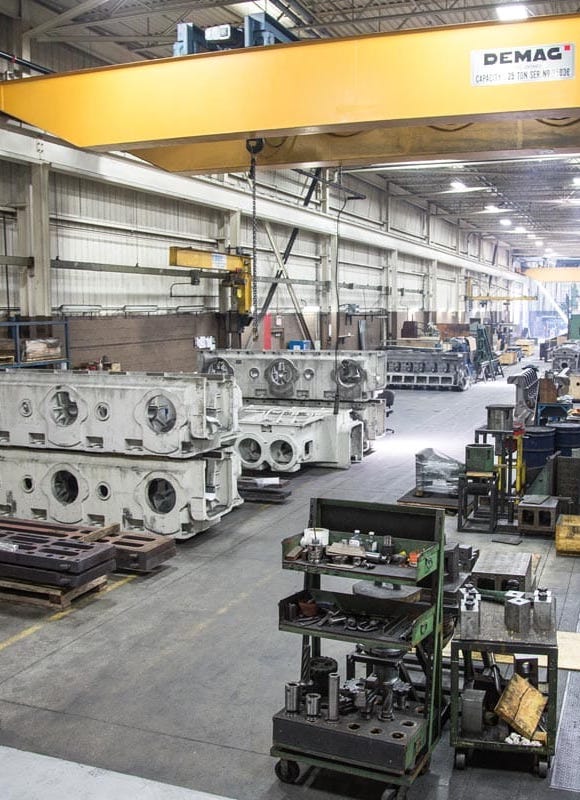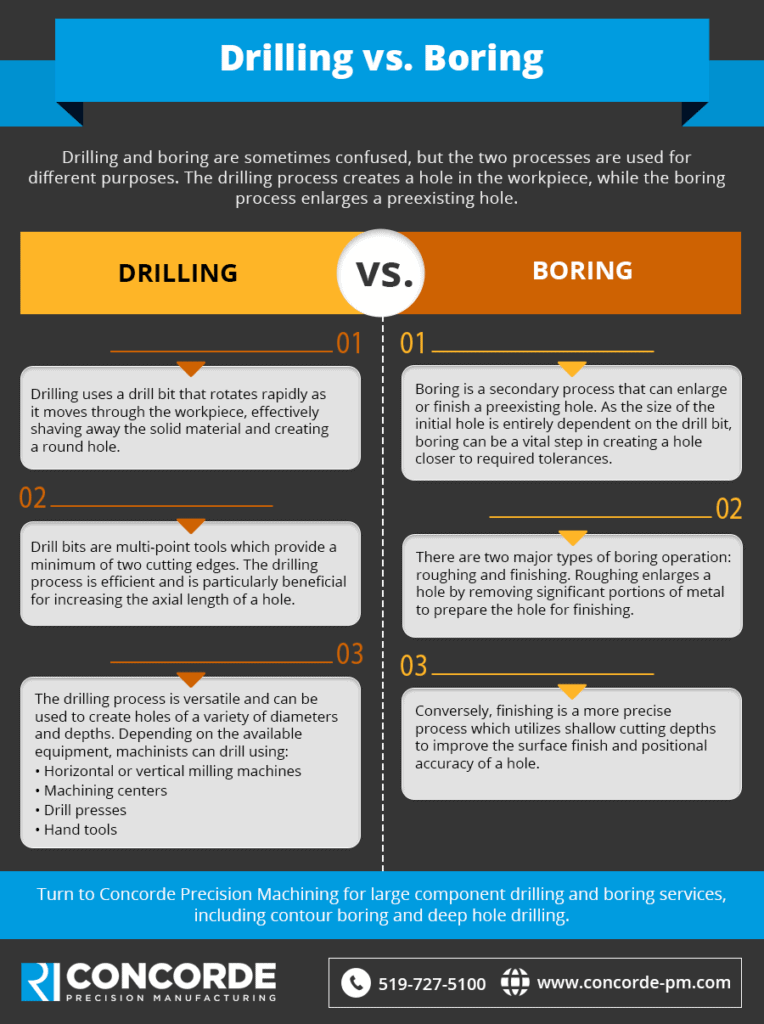Machining Solutions: Drilling vs. Boring
 Drilling and boring are sometimes confused, but the two processes are used for different purposes. The drilling process creates a hole in the workpiece, while the boring process enlarges a preexisting hole. Boring may be used to create closer tolerances and higher quality finishes in drilled holes.
Drilling and boring are sometimes confused, but the two processes are used for different purposes. The drilling process creates a hole in the workpiece, while the boring process enlarges a preexisting hole. Boring may be used to create closer tolerances and higher quality finishes in drilled holes.
What is Drilling?
Drilling uses a drill bit that rotates rapidly as it moves through the workpiece, effectively shaving away the solid material and creating a round hole. Drill bits are available in a comprehensive range of sizes to facilitate different hole sizes. Manufacturers of cutting tool equipment are constantly in a state of research and development to provide their customers the most cost-effective solution. Working with technically smart tool salespeople is important so that you are always at the cutting edge of what is available.
Drill bits are multi-point tools, which means they provide a minimum of two cutting edges. As such, the drilling process is fairly efficient and is particularly beneficial for increasing the axial length of a hole. The depth and diameter of the hole is directly dependent on the size of the drill bit.
It is important to note that improper chip evacuation can be a problem in this process, particularly on vertical style machines when drilling deeper holes. High pressure coolant will in most instances take care of this issue. Machinists must use the correct machining strategy to evacuate chips properly rather than continuing to drill without pause.
The drilling process is versatile and can be used to create holes of a variety of diameters and depths. Depending on the available equipment, machinists can drill using:

- Horizontal or vertical milling machines
- Machining centers
- Drill presses
- Hand tools
What is Deep Hole Drilling?
Deep hole drilling is a specialized drilling process which creates holes with a depth-to-diameter ratio of 10:1 or more. This manufacturing process is performed using specialized deep hole drilling machines or systems, which are designed to efficiently evacuate chips and deliver high pressure coolant. As an example, this process is commonly used to create barrels for firearms, though there are a variety of other applications across industries. At Concorde we have a portable deep hole drilling system which can be moved to one of three machines that have been set up for deep hole drilling. This allows us to deliver quick turn-around for deep hole drilling services.
<Find out what makes large part machining operations different from standard machining.>
What is Boring?
Drilling is the primary process used to create the hole, while boring is a secondary process that can enlarge or finish a preexisting hole. As the size of the initial hole is entirely dependent on the drill bit, boring can be a vital step in creating a hole closer to required tolerances.
There are two major types of boring operation: roughing and finishing. Roughing enlarges a hole by removing significant portions of metal to prepare the hole for finishing. This process is best for tolerances of IT9 or larger. Conversely, finishing is a more precise process which utilizes shallow cutting depths to improve the surface finish and positional accuracy of a hole. This process helps achieve close tolerances of IT6-IT9.
Unlike drill bits, boring bars are single-point tools and are capable of creating accurate holes. Contour boring operations are able to accurately produce tapered bore as well as bores with added features such as radii and chamfers. As the boring process does not drill straight through solid material, chip evacuation is rarely an issue. As such, boring bars may be fed continuously into the workpiece without much risk of clogging.
While some applications call for specialized equipment, such as jig borers and boring mills, boring can typically be achieved with more generalized machining equipment such as mills and machining centers.
Drilling and Boring Services from Concorde Precision Machining
With over 40 years of industry experience, Concorde Precision Machining provides expert large-part machining services for a wide variety of industries. Our capabilities include:
- Contour boring – DiAndrea boring system
- Deep hole drilling – Ejector drill system (Dia. Up to 7”, max. depth 70”)
- Large diameter boring and milling
Our advanced machining capabilities produce high-quality components that you can depend on. To see how our offerings can benefit your next project, contact us today.



